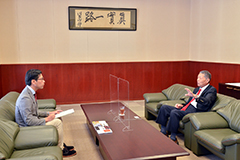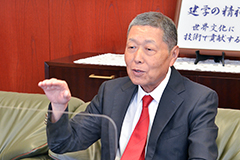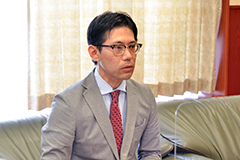Considering How to Solve Global Issues from the Perspectives of Earth and Planetary Science: A Dialogue With Distinguished Fellow Matsui Takafumi
2022.01.05
Distinguished Fellow Matsui Takafumi of the JICA Ogata Sadako Research Institute for Peace and Development (JICA Ogata Research Institute) is a world-renowned authority of Earth and planetary sciences and the current president of Chiba Institute of Technology. Research Fellow Endo Kei interviewed him to ask about his thoughts from the perspectives of Earth and planetary sciences on solving global issues and on international cooperation, which are areas JICA is also working on.

Their talk focused on how to solve global issues from the perspectives of earth and planetary science
Endo: When compared to the Earth’s history spanning over several billion years, the recent issue of global warming is taking place within an extremely short timeframe. As a researcher in Earth and planetary sciences, how do you see the current global warming?
Matsui: I have been studying how the Earth was born, how it evolved and came into its current state. Our planet’s environment has been greatly changing over the recent years. It is believed that during the first half of our planet’s history, environmental changes were rare and a warm humid climate was maintained. Yet from around halfway through its so far history, there was an event of extreme cold climate called Snowball Earth, in which the oceans froze all the way down to equatorial waters. Since then, warm humid and cold dry climates have been taking turns. As oxygen-producing photosynthetic bacteria called cyanobacteria appeared and flourished, oxygen concentrations rose and reached levels similar to today after the Snowball Earth occurred at the end of the Proterozoic. This led to great changes for life forms as well.
In fact, such changes in the Earth’s environment and the existence of life are inseparable. The Earth and life affect each other and are “coevolving.” The same applies to humans and the Earth. I believe that civilization is a way of life in which humans jumped out of the biosphere, a component of the Earth’s systems, and newly created a “Ningen-ken (anthroposphere).” Current environmental issues are indeed being caused as the result of the coevolution of our planet and civilization (anthroposphere), and are in a way, inevitable. We the homo sapiens acquired the ability to proactively utilize our interactions with the environment, actively overcame environmental changes and evolved. Human evolution, however, is not evolution in the biological sense which is caused by genetic mutations. It is rather a result of technological innovation. I think that the essence of the Earth’s environmental issues comes down to how we overcome them by causing technological innovations.
Endo: Are there any tips to address global warming that we can find through knowledge from Earth and planetary sciences?
Matsui: While I think that making great technological innovations is the right direction to go for, such has not happened to date. Nevertheless, if we want to solve global warming, all we need to do is to reduce the amount of carbon dioxide. In fact, processes to reduce the amount of carbon dioxide exist in the Earth’s systems in which humans are not involved. For example, rocks that originate from the mantle called ophiolites absorb atmospheric carbon dioxide to produce carbonate rocks like magnesium carbonate and calcium carbonate. The vast ophiolite dike in Oman is actually expanding over the years by absorbing carbon dioxide. If we could trigger this process artificially, rapidly and efficiently, we could make the Earth’s system reduce the amount of atmospheric carbon dioxide. If we could develop such new technologies, they could curb the increase of carbon dioxide.

Distinguished Fellow Matsui Takafumi, president of Chiba Institute of Technology
Furthermore, many helpful tips can be found in organism activities as well. Cyanobacteria, which I already mentioned, were different from other photosynthetic organisms in how they could break down water into oxygen and hydrogen using solar energy. This is precisely the generation of hydrogen energy. If humans could also use hydrogen energy and build an economy, we should be able to not produce waste like carbon dioxide. If we could link such principles to technological innovations, perhaps we could build stable civilizations that could achieve sustainable growth.
Endo: In relation to technological innovation, digital transformation (DX; lifestyle transformation through information communication technologies) is expanding these days. JICA is also assisting forest monitoring systems using geographic information systems (GIS) and waste management using drones in developing countries. Earth and planetary sciences are applying remote sensing technologies as well. Are there any examples of technologies that are expected to make some progress in the coming years?
Matsui: Artificial satellites can be seen as an example relevant to our lives. We used to launch huge satellites that weigh as much as 1-10 t, but the global trend from now on is to launch tens or hundreds of small satellites, each weighing about 50 kg or less, and orchestrate their operation and monitor the Earth. Sending commands from the ground would be too slow if we want to enable this though. The introduction of systems controlled by AI and big data that allow the satellites to autonomously make decisions would become necessary. If these become implemented, we would be able to get the latest data on an hourly basis and social infrastructure, measures against disasters and autonomous driving, for example, would all become drastically more convenient. I think such technologies can lead to DX.
Endo: Could you share an experience through your research activities that made you really feel the connection between Japan and other countries?
Matsui: I am studying the origin of Iron Age civilizations in Turkey right now. I have always had a great interest in history and in terms of looking at the connection between outer space and civilization, this is a really exciting research topic for me. In Iron Age civilizations, the first iron tools were those made from iron meteorites. Turkey is where the world’s oldest iron sword was discovered and was also where the Hittites, who are said to have given birth to Iron Age civilizations, used to live. Then why did the Hittites acquire ironworking skills? This is the question I want to solve, so I have been continuing studies in Turkey from around 2014. During various occasions to communicate with the Turkish government, such as to submit applications to conduct studies, I often think about international cooperation.

Research Fellow Endo Kei
Turkey has been a pro-Japan country throughout the years. In the 1970s, I travelled all over the Eurasian Continent by car and I remember when I went around Turkey, many people wanted to meet a Japanese and gathered around me when they saw the Japanese flag. I thought that it might be fun if we do some excavation work in a country like this, and Turkey remains pro-Japan to date. The Turkish government shows strong interest in Japan’s participation in leading the excavations. We have a field investigation planned around an archaeological site discovered in Turkey which is said to be the world’s oldest ruins of a temple. Because we would have to extensively investigate everything in order to study the relationship between our planet and the anthroposphere, we are preparing to deploy many researchers and conduct a full-scale study. This is also something that is becoming possible, thanks to the bond between Turkey and Japan with a long history and the pro-Japan attitude of Turkey. I think that when we conduct collaborative studies with a pro-Japan country, in the end it would become beneficial to Japan as well. This is the kind of international cooperation I envision.
Endo: I heard that in February 2020, you went to the Grand Egyptian Museum, which is scheduled to open in the near future, to carry out an investigation of an iron sword that was discovered inside Tutankhamun’s tomb. I heard that you also did the world’s first ever elemental distribution analysis for this sword. Could you share what the future outlook for your research work is like?
Matsui: I really enjoyed the investigation in Egypt. It was already known that this iron sword of Tutankhamun was made from iron meteorites, but how did they make this sword in Egypt back when they did not have the technologies to produce iron? We want an answer to this question, and instead of running a point analysis, we performed a surface elemental analysis. Moreover, we were able to gather novel information on where this sword was made by analyzing its hilt. We are currently putting the results together. Recently our paper was accepted in MAPS (international journal of Meteoritics and Planetary Science). Furthermore, we would like to conduct a study on all iron works made from ancient iron meteorites in Turkey as well to reveal how they were forged and where the technology came from. The division of ancient history into three periods—the Neolithic period, the Bronze Age and the Iron Age—is an established theory. However, my hypothesis is that iron and bronze both came into use at around the same time. With a view to propose a new periodization theory, I would like to try all kinds of analyses.
Endo: This is my last question. Could you give some advice on international cooperation especially to JICA?
Matsui: I think that JICA should collaborate more in academic research fields. For instance, in geological surveys and archaeological excavations, researchers participating from Japan communicate with local governments and the locals and obtain various kinds of information. You can gain an overwhelming amount of information through academic collaborations so I hope JICA can actively participate in them.
Endo: Thank you so much for sharing a really valuable story. It was full of dreams and now I am excited too.
Matsui: Sure. Because academic studies have to be fun!
Considering How to Solve Global Issues from the Perspectives of Earth and Planetary Science: A Dialogue With Distinguished Fellow Matsui Takafumi (The interview is in Japanese)

事業事前評価表(地球規模課題対応国際科学技術協力(SATREPS)).国際協力機構 地球環境部 . 防災第一チーム. 1.案件名.国 名: フィリピン共和国.

事業事前評価表(地球規模課題対応国際科学技術協力(SATREPS)).国際協力機構 地球環境部 . 防災第一チーム. 1.案件名.国 名: フィリピン共和国.

事業事前評価表(地球規模課題対応国際科学技術協力(SATREPS)).国際協力機構 地球環境部 . 防災第一チーム. 1.案件名.国 名: フィリピン共和国.

事業事前評価表(地球規模課題対応国際科学技術協力(SATREPS)).国際協力機構 地球環境部 . 防災第一チーム. 1.案件名.国 名: フィリピン共和国.

事業事前評価表(地球規模課題対応国際科学技術協力(SATREPS)).国際協力機構 地球環境部 . 防災第一チーム. 1.案件名.国 名: フィリピン共和国.
scroll